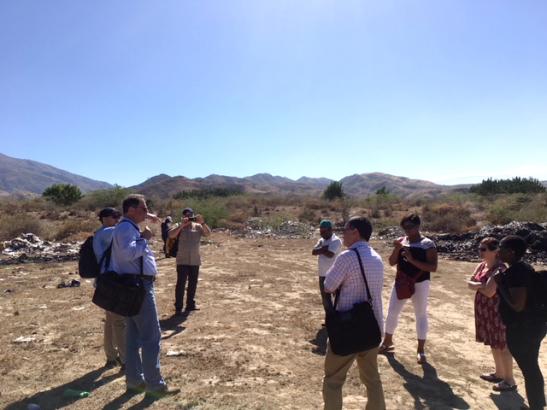
The State University of New York Maritime College has joined a growing group of SUNY campuses on the Sustainable Village and Leaning Community (SVLC) project in Arcahaie, Haiti. The development of the project will span over 10 years and is slated to incorporate economic development and applied learning around healthcare, agriculture, clean energy, the arts, social entrepreneurship and maritime activities through community-based collaboration. The project is supported by the W.K. Kellogg Foundation.
A SUNY delegation traveled to Haiti in February 2018 to meet with national and local maritime organizations, visit ports and gather information that will help inform the SVLC project. Joining the staff of the SUNY Office of Global Affairs Learning Through Development unit were Dr. Richard Burke, ABS Professor of Naval Architecture and Marine Engineering in the Engineering Department at SUNY Maritime College, and Dr. Christopher Clott, ABS Professor of Marine Transportation and Logistics in the Global Business and Transportation Department, and SUNY Maritime student Iniko Villard. In Port-au-Prince, the group met with SEMANAH (Service Maritime et de Navigation d’Haïti) Director General, Captain Dieudonné Bruno and his staff to discuss potential collaboration around maritime education and industry development. In addition, the team met with SYMG (Le Syndicat des Marins de La Gonâve) on the island of La Gonâve to discuss the island’s participation in a local and national maritime strategy.
The team also visited the site of the SVLC in Luly, Haiti, where they were joined by Arcahaie mayors Mr. Wilson Jean Francois and Mr. Garry Joseph. The mayors explored the region with the group and presented examples of shipyards and potential sites of SVLC maritime activities in Arcahaie. More activities are planned for the year including campus visits to SUNY Maritime and several return trips to Haiti to continue working with officials and community members.
“Ship repair and shipbuilding are not only exciting activities from an academic perspective,” said Dr. Burke, “but a shipyard can have a large, positive effect on the economy. Shipyards train workers in new and useful skills, support maritime interests, and earn foreign currency.”
“Located as it is on an island, developing a safe and sustainable maritime strategy will have a significant impact on Haiti’s continued development,” said Dr. Clott. “Ensuring that mariners, port operators and other maritime professionals are properly training and equipped is vital to that development.”
“Being part of a team to give the children of Haiti access to a modern and sustainable education is priceless. I am a true believer that the Sustainable Village and Learning Community project for Haiti will be a great success,” said Iniko Villard, a senior International Transportation and Trade student from Port-au-Prince, Haiti. “Growing up, I had access to good education, to a roof over my head and I knew when I would have my next meal. That is a real privilege in Haiti. I always dreamed of helping my people who are in desperate need and to give them access to a good education.
“On this trip, I took a lot of pride to show my country and the endless opportunities that are available there, and also to show the need and necessity for a project like this in Haiti.”
“SUNY Maritime is looking forward to continuing the conversation with the Haitian authorities and to working with the State University of New York and other partners, with the generous support of the W.K. Kellogg Foundation, to develop the Sustainable Village and Learning Community,” said Dr. Joseph Hoffman, provost and vice president for academic affairs at SUNY Maritime. “Our naval architects, professional education and training professionals, and port-operations experts will be able to offer insights and advice to help Haiti’s maritime infrastructure develop and continue to improve.”
